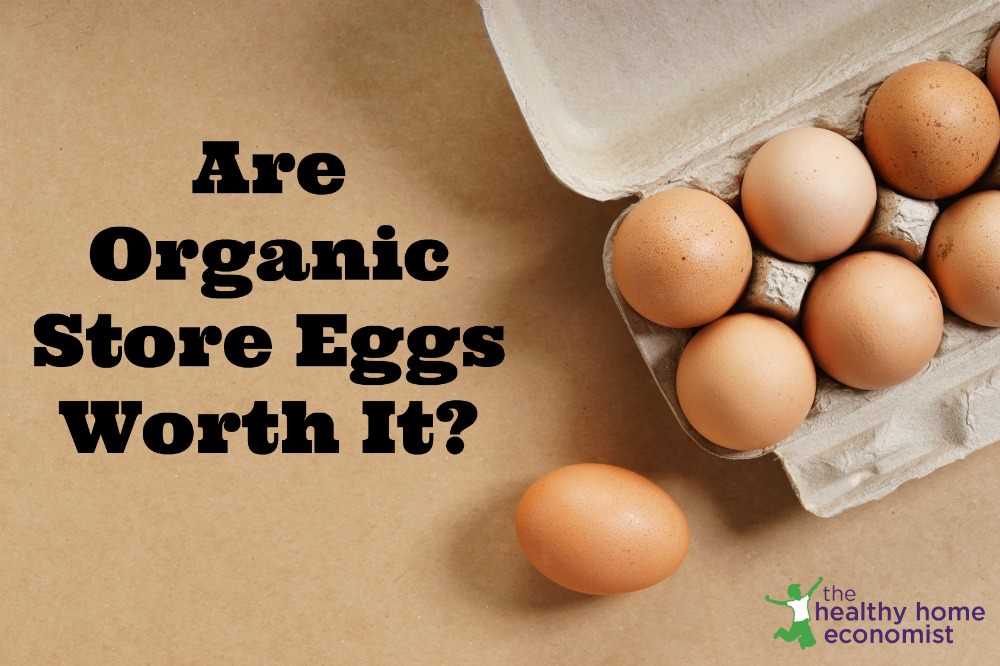Table of Contents[Hide][Show]
 Food manufacturers have attempted to demonize eggs for decades. It is infinitely more profitable to convince the public to eat Egg Beaters and processed vegetable oils than to encourage them to consume the non-patentable perfection that is the egg.
Food manufacturers have attempted to demonize eggs for decades. It is infinitely more profitable to convince the public to eat Egg Beaters and processed vegetable oils than to encourage them to consume the non-patentable perfection that is the egg.
Even folks who see through the marketing hype against eggs that is cleverly disguised as “science” frequently get waylaid by the free range and organic eggs labeling on egg cartons.
The truth is that buying organic, free range eggs from the supermarket or healthfood store is no guarantee that the birds lived a healthy life. What’s more, the eggs may not even be that nutrient dense. You’re safer buying duck eggs or goose eggs as these types of birds are more resistant to industrialized living. Even when domesticated, they eat more closely to their native diet than chickens.
Let’s take a look at why organic chicken eggs are a scam.
Organic Eggs Reality Check #1
Did you know that there are no requirements for the quality or amount of time spent outside for organic eggs or even free range eggs? This means that organic eggs could actually be from hens who get basically no bugs in their diet from pecking in the ground. If the hens don’t get to peck around in the ground for grubs and insects, the eggs they produce will have drastically reduced nutritional value – organic or not.
Organic Eggs Reality Check #2
Did you know that the hens from a free range or organic eggs farm can still have their beaks cut and be subjected to forced molting which involves starving them for 7-14 days which can in some cases kill them?
Organic Eggs Reality Check #3
Organic eggs marked as “cage free” does not mean that the hens have access to the outdoors or even daylight! The hens could actually be running around inside with artificial lighting on a concrete floor and the eggs still qualify as cage free!
The only way to get truly healthy eggs where you can be sure the hens are not abused is to buy local from a farmer you trust, not organic eggs from the store!
There is no way around this folks that I have found. You must start connecting with the people in your community if you really want to source some decent eggs!
Folks in my buying club regularly tell me how shocked they are when they run out of the eggs sourced locally and buy a carton of organic eggs from the store how puny, pathetic and bland tasting they are. They are also incredibly expensive.
Not only will you more than likely save yourself some money buying eggs locally, you will also be helping a local business remain viable and improving the nutrient density of your diet all at the same time!
Organic eggs most definitely does not always mean better!
Need more egg recipes once you’ve found a quality local source? Try these breakfast egg ideas, easy lunch egg recipes, and dinner egg recipes for inspiration!
Below is a fantastic infographic on the reality behind the egg industry created by Kristin Lindquist. What factoids did you find most alarming?
More Information
Best Egg Substitute (plus Video)
Organic Store Eggs Just Don’t Stack Up
What Oxidizes the Cholesterol in Eggs?
Think You Have Fresh Eggs? Here’s How to Tell









organic store eggs >>> vegan subsitutes tho
Wow. Thank you for sharing!!
I have an egg lady down the road from me!! NO comparison to the quality of those eggs!!!!
Hi All-I may have missed this in the above comments, but I found organic eggs at a local store, that say: “USDA ORGANIC, certified organic feed, “Certified Humane Raised and Handled”. Do you guys think that those are good eggs? Thanks for your thoughts.
As much as I would love to, we can’t afford eggs from a local farmer. Not only would they cost at least $4/dozen, but I would have to add the cost of gas (at least half hour each way) which is now nearly $4 a gallon! We buy organic for nonGMO reasons, not really for them being ‘humane’, I know they aren’t.
Thanks for this interesting but equally important information. I honestly have no idea about how eggs are produced and marketed in the farms. But its quite alarming to find out about the life of hens when they are just caged to produce eggs. If there is really no significant difference in the quality of eggs produced between hens that are caged and those that are not, then I don’t see a need for them to be prohibited from doing their activities.